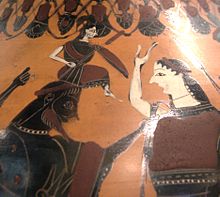
Back Eileithyia ALS إيليثيا Arabic Илития Bulgarian Eileithyia Breton Ilitia Catalan Eileithýia Czech Eileithyia Danish Eileithyia German Ειλείθυια Greek Ilitio Esperanto
| Eileithyia | |
|---|---|
Goddess of childbirth | |
 | |
| Abode | Mount Olympus |
| Personal information | |
| Parents | Zeus and Hera |
| Siblings | Aeacus, Angelos, Aphrodite, Apollo, Ares, Artemis, Athena, Dionysus, Enyo, Eris, Ersa, Hebe, Helen of Troy, Hephaestus, Heracles, Hermes, Minos, Pandia, Persephone, Perseus, Pollux, Rhadamanthus, the Graces, the Horae, the Litae, the Muses, the Moirai |
| Children | Sosipolis |
| Equivalents | |
| Roman equivalent | Lucina |
| Egyptian equivalent | Taweret |
| Part of a series on |
| Ancient Greek religion |
|---|
 |
Eileithyia or Ilithyia (/ɪlɪˈθaɪ.ə/;[1] Greek: Εἰλείθυια; Ἐλεύθυια (Eleuthyia) in Crete, also Ἐλευθία (Eleuthia) or Ἐλυσία (Elysia) in Laconia and Messene, and Ἐλευθώ (Eleuthō) in literature)[2] was the Greek goddess of childbirth and midwifery,[3] and the daughter of Zeus and Hera. In the cave of Amnisos (Crete) she was related with the annual birth of the divine child, and her cult is connected with Enesidaon (the earth shaker), who was the chthonic aspect of the god Poseidon. It is possible that her cult is related with the cult of Eleusis.[4] In his Seventh Nemean Ode, Pindar refers to her as the maid to or seated beside the Moirai (Fates) and responsible for the creation of offspring. Her son was Sosipolis, who was worshiped at Elis.[5]
- ^ Joseph Emerson Worcester, A comprehensive dictionary of the English language, Boston, 1871, p. 480, rule 3, where he notes the word has four syllables as in Greek and Latin, "not I-lith-y-i'-a as in Walker" (e.g. Walker and Trollope, A key to the classical pronunciation etc., London, 1830, p. 123).
- ^ Nilsson Vol I, p. 313
- ^ Gantz, pp. 82–83.
- ^ F.Schachermeyer(1967).Die Minoische Kultur des alten Kreta. Kohlhammer Verlag Stuttgart. pp. 141–142
- ^ Pausanias, Description of Greece, 6.20
© MMXXIII Rich X Search. We shall prevail. All rights reserved. Rich X Search